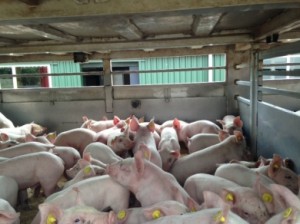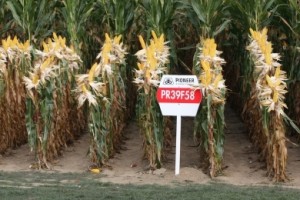Nieuw Worldlog Marianne Thieme
Eindelijk komt de controle van diertransporten weer in overheidshanden. In 2011 diende ik hier al een motie over in, die ook werd gesteund door een meerderheid, maar we moesten tot 2014 wachten tot de staatsecretaris ook inzag dat het zo niet langer door kon gaan. Staatssecretaris Dijksma van Economische Zaken liet vorige week eindelijk weten dat zij het toezicht- en controlesysteem van de diertransportsector niet langer meer erkent en de verantwoordelijkheid weer in eigen hand neemt.
Jaarlijks gaan er miljoenen dieren in vrachtwagens de grens over. De transporten gaan regelmatig gepaard met ernstig dierenleed. Dieren staan vaak meer dan acht uur lang in overvolle wagens zonder voedsel of water. Regelgeving om de dieren te beschermen wordt slecht nageleefd en er is de afgelopen jaren drastisch bezuinigd op het overheidstoezicht. Zelfregulering binnen de diertransportsector blijkt dus niet te werken. De Kamer is duidelijk geweest: de overheid moet doen waar ze voor is, namelijk normstelling, controle en handhaving. Snelheidscontroles leg je ook niet in handen van automobilisten zelf. We zijn blij dat het toezicht eindelijk weer terugkomt bij de overheid en zullen ons blijven inzetten om het gesleep met dieren te stoppen!
Mijn collega Esther Ouwehand heeft zich afgelopen week sterk gemaakt tegen de introductie van een nieuw gengewas in de EU. De Europese Commissie dreigt toestemming te geven voor de teelt van de door Pioneer genetisch gemanipuleerde maissoort 1507. Als dat gebeurt, worden alle Europese lidstaten verplicht de teelt van dit omstreden gewas toe te staan op hun akkers.
Landen die geen risico’s willen lopen met gentech, zoals Oostenrijk en Frankrijk, maken al langere tijd bezwaar. Nederland heeft nog altijd niet duidelijk gemaakt wat haar positie is, terwijl die bepalend kan zijn voor het besluit over toelating van deze teelt in de hele EU. Wij hebben onze regering dan ook opgeroepen de keuzevrijheid van burgers, boeren en lidstaten voorop te stellen en tégen de toelating van nieuwe genetisch gemanipuleerde gewassen te stemmen.
Wij wijzen genetische manipulatie resoluut af en vinden dat landen in elk geval niet gedwongen mogen worden om gengewassen te laten verbouwen op hun eigen grond. De omstreden mais van Pioneer is een genetisch gemanipuleerde plant die continu een gifstof afgeeft. Het gif dat de plant zelf produceert is bedoeld om de maisboorder uit te schakelen maar brengt ook schade toe aan andere vlinders en motten. Bovendien is de plant resistent gemaakt tegen bestrijdingsmiddelen die glufosinaat bevatten. Terwijl wetenschappers waarschuwen dat het resistent maken van gewassen een hoger gebruik van landbouwgif in de hand werkt, staat Brussel op het punt een gengewas toe te staan dat resistent is tegen een middel met grote risico’s voor zoogdieren en andere organismen. Vanwege de gevaren van glufosinaat wordt juist getracht het gebruik van deze onkruidbestrijder aan banden te leggen. Hopelijk ziet onze regering ook de gevaren van het toestaan van genetisch gemanipuleerde mais en houdt ze dit tegen!
Deprimerend om te lezen hoe het gaat met Bulgarije en Roemenië. Lees hier het blog in The Economist over de situatie in deze twee landen.
Ook deze week weer een foto van @Fascinatingpics: Freefall!
Tot volgende week!
Marianne
The control of animal transportation will at last go back into the hands of the government. In 2011, I already laid down a motion on this, which was then also supported by the majority, yet we had to wait until 2014 before the State Secretary finally realised that animal transportation couldn’t go on like this. State Secretary Dijksma of Economic Affairs finally informed us last week that she no longer acknowledges the supervision and control system of the animal transportation industry and that she is taking responsibility into her own hands again.
Each year, millions of animals are transported across the borders. Those transportations regularly involve animal suffering. Animals often have to stand in overcrowded lorries for more than eight hours without any food or water. Animal protection regulations are seriously violated and drastic cuts were imposed on government control over the past years. Self-regulation within the animal transportation industry is obviously not working. The Lower House was clear: The government must do what it is there to do, namely to set standards, and to control and maintain them. You would not opt for car drivers to perform their own speed checks either. We are glad that the supervision is given back to the government and we will continue to do our best to stop them mucking about with animals.
Last week, my colleague Esther Ouwehand made out a case against the introduction of a new GM crop in the EU. It is feared that the European Commission will permit the growing of the genetically modified maize line 1507 of Pioneer. If that happens, all European Member States will have to allow the growing of the controversial crop on their lands.
Countries that do not want to run risks with genetically engineered foods like Austria and France have been objecting for a long time. The Netherlands has still not made clear its position on this, while this can be the determining factor in reaching a decision on permitting this crop in the entire EU. We have therefore urged our government to put the choice of civilians, agriculturists and Member States first and foremost, and to vote against permitting such new GM crops.
We resolutely reject genetic modification and feel that no country should be forced to have GM crops grow on their lands. The controversial maize of Pioneer is a genetically modified plant, which releases a poisonous substance. The poison produced by the plant itself is intended to eliminate the corn borer, but is harmful to butterflies and moths at the same time. Additionally, the plant has been made resistant to pesticides containing gluphosinate. While scientists warn that the use of pesticides will increase when crops are made resistant, Brussels is on the verge of accepting a GM crop that is resistant against a pesticide that has great risks for mammals and other organisms. Because of the dangers of gluphosinate, it is tried to restrain the use of this pesticide. Hopefully our government will also see the dangers of allowing genetically modified maize and stop it!
It is depressing to read how Bulgaria and Romania are doing. Read here the blog in the Economist about the situation in those two countries.
And this week again a picture of @Fascinatingpics: Freefall!
Until next week!
Marianne

